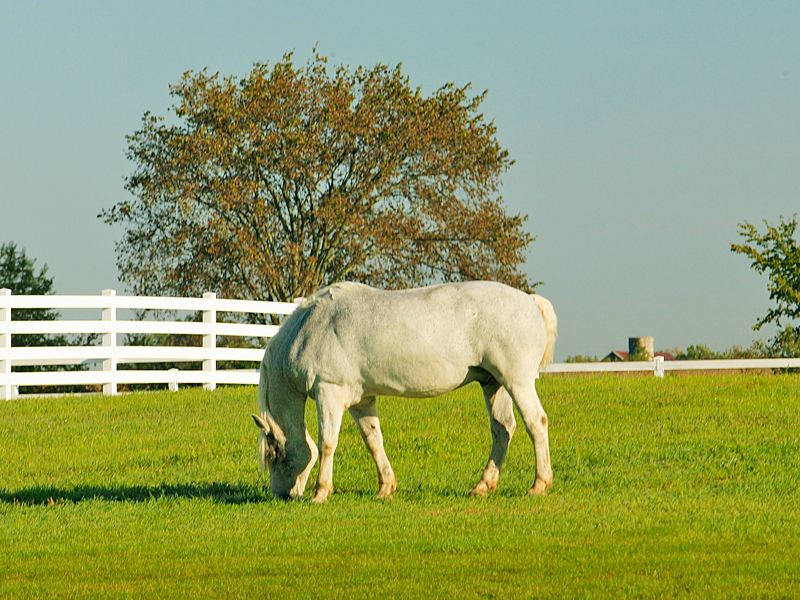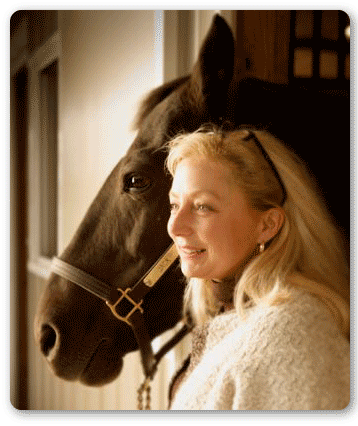Any Signs of Soreness with Your Horse?

The good news was that our pastures were looking beautiful by the end of June. Lush grass and happy horses out on the pastures.
Ever since I can remember, we have kept our horses on a yearly turn out schedule: out as much as the weather permits in the cold months, and as soon as warm weather hits, in during the day and out at night. It has always worked for us and this year was no exception. Just a few weeks ago our rain subsided, and the grass began to look a bit brown. Just about a week ago, one of our ponies started to act like he was sore. Every horse owner will understand this thought process that follows this type of behavior. We try to think back over anything that would have created the issue.However, I could not think of what would have caused him to suddenly be sore! With all of my experience, I could only surmise that maybe this pony was a bit older and perhaps arthritis had set in? Did he hurt himself running in the pasture? Should I keep him in, or was it better for him to be out? Fortunately, for just this reason, we laid out our pastures with a 'holding area' that is our dry lot. This holding area is a 'gathering paddock' that each of the connected pastures can open in to. The horses can all come to one 'catch area' before we walk them into the barn. It serves a good purpose for bringing the horses in, as well as being used to keep horses off the pastures when needed. We decided to keep Caz in the smaller dry lot for a few days to see how he would do.
 The following day our farrier was to arrive in the morning. I told him how our pony was acting and with one look he determined that Caz was showing signs of founder, also called laminitis. I was so surprised that I had not thought about that since we have not had any cases of it with the turn out schedule that we have always followed. But as he explained, Caz had a bit of what is called a 'founder stance'. Since the front feet usually are affected, horses shift their weight to the back legs and the front legs are extended. I could see what he was saying but, thankfully, it was only slight. He could detect that the digital pulse was increased, and therefore, our pony was a sore boy. His suggestion, as well as our Vets recommendation, was to put him on 2 grams of bute for about 4 days and drop him to one a day for a few more days after that. We also put him on stall rest until we could see signs of relief. Additionally, we only give our pony a handful of grain a day, which we stopped. We also opted for a paste bute rather than a powder that would have to be mixed in with grain or 'applesauce' to get Caz to eat it. In exchange for the pasture grass, we put him on grass hay only.
The following day our farrier was to arrive in the morning. I told him how our pony was acting and with one look he determined that Caz was showing signs of founder, also called laminitis. I was so surprised that I had not thought about that since we have not had any cases of it with the turn out schedule that we have always followed. But as he explained, Caz had a bit of what is called a 'founder stance'. Since the front feet usually are affected, horses shift their weight to the back legs and the front legs are extended. I could see what he was saying but, thankfully, it was only slight. He could detect that the digital pulse was increased, and therefore, our pony was a sore boy. His suggestion, as well as our Vets recommendation, was to put him on 2 grams of bute for about 4 days and drop him to one a day for a few more days after that. We also put him on stall rest until we could see signs of relief. Additionally, we only give our pony a handful of grain a day, which we stopped. We also opted for a paste bute rather than a powder that would have to be mixed in with grain or 'applesauce' to get Caz to eat it. In exchange for the pasture grass, we put him on grass hay only.Founder, or laminitis, can have several causes. Our case of founder most likely was from our rich grass that contained more sugar than our pony needed, (according to our Vet). It's one 'vascular' disease that is good to be sure to keep in mind when your horses are on pasture a lot or, in our case, your pastures are quite lush. Veterinarians who know breeds and the conditions that create founder can diagnose and initiate proper therapies. As always, contact your Vet at the first signs of any behavior that seems out of the ordinary.
With the proper care, Caz should be feeling much better soon. However, he will be limited to the amount of daily grass that he can have. This is a good reminder to be sure you think about how much grass your horses eat and, if in doubt, limit their time in pasture.
Tip : It is good to think about fencing layouts that have a dry lot area or paddock that has very little grass in it. Always supplement dry lots with grass hay (horses are grazing animals and need to have the ability to eat hay in place of pasture grass). A round pen could also be used inside of your pasture for a temporary enclosure (just be sure that the area contains very little to no grass). You can find further information concerning laminitis and founder on the web, or consult your Vet.
 Debbie has over 45 years experience with horses and equine-related businesses. She has owned, trained, boarded horses and run stables at various times in her career. She is a certified fence installer, has given balanced riding lessons, and has shown horses in Western, Western Pleasure, Trail, English, Hunter/Jumper, Fox Hunting, Hunter Trials, Dressage and driving classes. Debbie has been involved in foaling, and just about every aspect of horse ownership possible, and she welcomes your questions and comments. If you are interested in using any articles by Debbie, please send her an email.
Debbie has over 45 years experience with horses and equine-related businesses. She has owned, trained, boarded horses and run stables at various times in her career. She is a certified fence installer, has given balanced riding lessons, and has shown horses in Western, Western Pleasure, Trail, English, Hunter/Jumper, Fox Hunting, Hunter Trials, Dressage and driving classes. Debbie has been involved in foaling, and just about every aspect of horse ownership possible, and she welcomes your questions and comments. If you are interested in using any articles by Debbie, please send her an email.
RAMM Fence Systems, Inc. makes every effort to provide reliable and useful information on horse health, care and products. The statements made on this website are based on years of experience with horses, however, they are based on generalized situations and should not replace diagnosis or treatment by a veterinarian or consultation by a professional. RAMM Fence Systems, Inc. does not assume any legal responsibility. Readers should always consult qualified health care providers for specific diagnosis and treatment.
